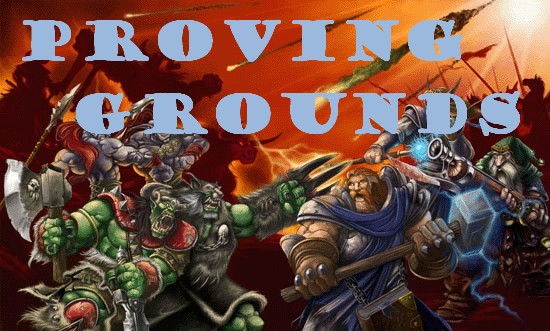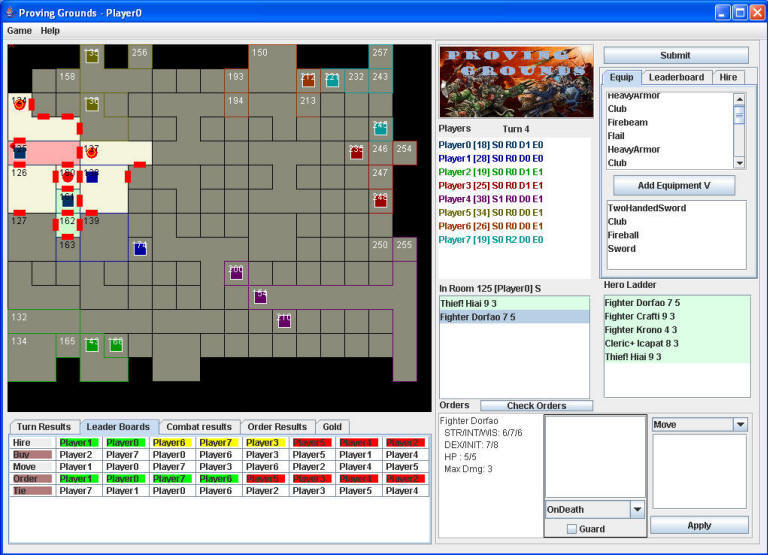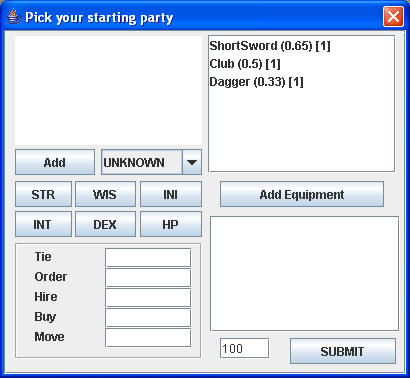|
Dwya stood slowly, feeling the stiffness in his legs. A remnant of a half an hour kneeling quietly at the rough wooden door, it wasn't unusual. Confident there was no one on the other side of the door to notice, he started patting the pockets of his leather tunic until he found one of his few remaining cigarettes, hunted around more vigorously for a wizard stick to light it, and finally cursed as he realized he didn’t have any. The glowstick he used for lighting the room, while environmentally friendly, threw off about as much heat as an ice cube. Where was a damn wizard when you needed one?
There was the muffled thud of a fireball going off in an adjoining room and the sudden clanging and harsh yells of combat. Dwya decided that perhaps their wizard had better things to do than a minor magic to give him a light.
He slipped the cancer stick back into a pocket and moved into a room they had previously cleared of a few goblins, beginning his sweep of the area that had been claimed by his team. He paused suddenly, and then moved quietly to another door that he had spiked shut earlier, gently resting his ear on the rough wood. He heard the same whisper of sound that alerted him in the first place, the sound of someone equally surreptitious moving in the other room. What he didn’t hear was the guttural snarl of Orcish or the metal clatter of a High Orc, a Urakai, moving around in battle armor. He pulled the Amulet of Hud the Overlord had provided each of them out of yet another pocket, gazed into it, and saw a recognizable representation of the maze with small dots indicating the location of every human currently cleaning the place out. The Overload had made it part of the game, and had told them that it was to prevent accidental conflict between the different teams during the contest. Everyone knew, however, that those accidental conflicts happened fairly regularly, and Dwya had his own opinion. Whoever won the competition would become one of the elite Phoenix Guard units that served the Overload directly, living a life of luxury when they were not on duty. Dwya suspected that the Overload wanted to know that his people could cooperate when the need arose. Speaking of which…
The man on the other side of the door spoke first. “How’s it hanging, Dwya?” Dwya recognized the voice, but he already knew who it was from the Hud. It was Ergru, a thief on another dungeon crawling team.
“Well. We’ve cleared out eight rooms at this point, recovered a few gems, a dozen gold pieces.” “Nice, but I hear that Gulden’s team is really kicking all our asses.”
“Ya, heard the same thing. But, you know the Overlord’s rules; they have to come out with enough gems to even be considered. I happened to hear that they are collecting Sapphires. I’ve also heard you have quite a few yourselves.”
“Could be” answered Ergru, cautiously, not knowing where the conversation was going.
“Well, I happen to have a Sapphire that isn’t going to help me much. And I’ve heard you’ve picked up a Ruby. My team happens to have collected quite a few of them."
“And you want to trade?” asked Ergru, comprehension dawning.
“Definitely. And all I ask in return is that you throw in a wizard stick if you’ve got one.”
PROVING GROUNDS
Proving grounds is a Chainmail version of a D&D dungeon crawl, that is, a statistical abstraction of the movement and combat involved in such a venture. Each player runs a party of adventurers who are trying to win a competition staged by the Invincible Overlord by clearing out a dungeon carefully stocked with Goblins, Orcs, Urakai and Dragons for the game. In order to win, they must prove themselves generous, ingenious, and successful. Generous by providing the most of a single kind of gem to the Overload, ingenious by collecting the most gold, and successful either by capturing the most rooms in the dungeon or surviving with the most heroes.
GETTING STARTED
You're on the right track by reading these rules. To play the game, you must have Java 1.5 installed (1.6 is preferred). Download the ProvingGrounds.jnlp file and unzip it (location is up to you). Double click on it; the lobby application should download and start automatically. From the lobby application, select "configure games" off the menu. Click the "new" button, and create a local ProvingGrounds game, leaving it as a DEMO game. Save it. Go back to the menu and restart the ProvingGrounds DEMO game (it will ask you if you want to overwrite the existing game; say "yes."). Go back tot he menu and open the ProvingGrounds DEMO game. You are ready to play. If you're hard core, just go to the rules and have at it. If you want a easier introduction, you can look a the Proving Grounds Starter Movie. This is a 100M file and may take some time to download (you may want to save it instead of opening it directly in Internet Explorer). Also be aware that the game moves on and some of the information in the movie may be out of date.
THE DUNGEON
The Dungeon consists of a set of rooms connected by doors. Each player has an entry room around the periphery of the dungeon. Subsequent additions to your group will appear in this room. As the dungeon is first entered, you know the general layout of rooms, but not how they are connected to each other. As you enter rooms, you will “see” everything in the room and will slowly discover information about the rooms adjoining it. Once a group is familiar with a room, they continue to know what happens in it, so you gain a general understanding of the dungeon’s layout as time progresses.
A room that is occupied by a player at the end of the turn becomes “owned” by that player. This is significant because you may move through rooms you own during the turn, while moving into a room you don’t own ends your movement. Keeping a clear path back to your starting room is critical for new hires to join your group. Movement is stopped if the room has been entered during the turn by someone other than your group.
Rooms you own, even if not occupied, continue to allow you to find out about the rooms they are connected too, at a slightly slower rate (every other turn). You can also see traps and spiked doors in rooms you own as small red dots and "S" and "T" tags on the room description.
The player with the most rooms at the end of the game gets a 10 gold reward from the Overlord. Rooms occupied by another player are indicated by squares with that player's color. Rooms with creatures are indicated with red circles. If you know the detailed information about the creatures in a room, and they have a gem, it is indicated by a yellow dot in the middle of the red circle. The currently selected room (room shown in the "in room" pane) is colored pink.
The player list shows the players, current Gold, and current number of gems.
Turn results, leader boards, combat results, order feedback, and an accounting of how you spent and received gold are shown in the lower left hand corner (tabbed pane).
"Special" actions are shown in the upper right hand corner, and include buying equipment, hiring new heroes, and bidding on leader boards. These can occur every turn but:
Hero details are shown in the "orders" pane, which shows details on the hero selected, their equipment, their current "retreat policy", whether they are in "guard" mode or not, and allows you to enter orders for your heroes.
The Hero Ladder shows all your currently active heroes. Click on one will automatically select the room that hero is in.
GAME START
The first turn of the game, you select your party. You have 100 gold to spend; any you do not spend remains for your first turn. You may add party members of whatever class you would like, improve statistics, and purchase equipment (from a limited set) up to 100 Gold pieces; you may also bid on leaderboards. The first turn, leaderboard placement is completely based on your bid (and random on a tie); it can be advantageous to start high on the leaderboard.
GAME END
The game ends when the last room is entered. There is also a 20% chance each turn of the game ending after there are only five unexplored rooms left. There is an additional 20% chance each turn of the game ending after turn 30.
When the game ends, the gems owned by a player are tallied up. To be considered in selecting a winner, the player must have the most of one kind of gem. Ties are decided by the tie leader board (see the leader board section of the rules). Typically there are only enough different kinds of gems for half the players to be considered, but if one player has the most of more than one kind of gem, it can be even fewer.
When all players that have the most of one kind of gem are selected, an additional 10 gold pieces are awarded for having the most rooms and having the most surviving party members. If players tie, both players are awarded the gold.
Then total gold is tallied. The player with the most gold wins, Ties are decided by the Tie Leader Board.
PLAYER PARTIES
Player parties consist of a group of heroes. Heroes can typically move or trade with another player's hero each turn. They can also equiping or unequip items, but these do not count as actions. Certain character classes have special options as indicated below.
You can do hero orders by using the drop down menu in the hero order panel, or, to move a hero, by selecting the hero in the room display list or hero ladder list and then left clicking on the room to which they are to move (must be adjacent to the room the hero is in). The hero's movement is indcated with a red line. You may move a hero as far in rooms you own as you want, but once the hero has moved outside your zone of control, they stop.
Heroes fall in four categories, Fighters, Clerics, Wizards / MUs, and Thieves. Clerics and Wizards can cast spells, using spell points, which can be recharged by resting. Thieves can do several sneaky thief things; pay attention, because many of them are critical.
Heroes have several characteristics that vary in capability from 2 to 12.
Heroes can equip themselves from a communal stockpile and can carry small items, like gems. They can equip/unequip as many times during the turn as they want.
Actions available to all classes include:
Actions available to Clerics only inlcude:
Actions available to MUs include spells. Spells can be very powerful. They fall in two categories, regular spells and battlemagic. Regular spells are done as a player order. Battlemagic spells are cast automatically if the MU enters combat.
In order to cast a spell, the Wizard must be equipped with it, with the exception of the "Noise" and "Lure" spells. They may only be equipped with one Battlemagic spell at a time, but are unlimited in regular spells. Spells require different amounts of Mana. Wizards regenerated 1 Mana point up to their maximum for each turn they rest. If they are hit in melee before they can cast battlemagic, they must save at 3D6 vs. INT to avoid breaking spell prep. Spell prep takes three combat rounds.
Additional Thief actions are outlined below. If thieves do nothing during a turn, they will automatically search a room for hidden caches of gold. They will know if the room is tapped out if there are no caches left.
Posture – Heroes can be in a Guard posture. This causes them to absorb more of an enemy group’s attack. See combat.
Retreat Policy – Heroes can be have one of three retreat policies. Retreat will only occur if there is a place to retreat to. A room can be retreated to if it is not conflicted (no battles during the turn and no "noise" spell cast), not spiked, and not occupied by someone else’s group (or dungeon dwellers). Retreat locations will be selected in the following order:
The retreat policies are as follows, from most limiting to least limiting:
COMBAT
Combat consists of players and creatures attacking in initiative order. They attack individual in the order in which they entered the room. Since entry into a room keeps others from entering, there is at most two players, or one player and some creatures.
For instance, a party with two fighters and a cleric enter a room; the fighters have a 5 initiative and the cleric has a 7. When the party is moved into the room, the fighters are moved, followed by the cleric. The cleric will attack first, as he has the higher initiative. However, monsters in the room will attack the fighters first, because they entered the room before the cleric. Attacks occur as follows:
If the hero is a wizard with Battlemagic, they will attempt to prep and use it. Battlemagic is prepped prior to entering a room and therefore will fire the first melee round. Prepping a second cast take 3 turns. If the wizard is hit prior to releasing the spell, they must do a 3D6 save vs. Intel or the prep is broken and the must re-prep (note this is true the first turn if an creature or enemy group has a higher initiative than the MU and therefore attacks first).
Heros without battlemagic swing every turn. Their DEX + chance adjust must be greater or equal to the defenders DEX to hit. If they hit, they do STR * weapon effect damage.
Damage is absorbed by armor. Light armor absorbs one point of damage heavy armor absorbs three points of damage. However, heavy armor reduces dexterity by two.
If a hero is killed, and the party has a cleric, the cleric will cast a Emergency CLW which will keep the hero alive with 1 hit point left. They may only do this once during an attack. If individuals in a group with someone saved by an Emergency CLW are set to “Retreat on first death,” they will retreat despite the save.
Combat continues until someone retreats or one entire group is eliminated.
SPECIAL ORDERS
There are, in addition to hero orders, player based actions during a turn. There are three; hiring, buying equipment, and shuffling the leader boards.
Hiring turns allow you to add additional heroes to your lineup. You are bidding directly against other players for each new hire, with the winner depending on amount bid, place on the order leader board, place on the tie leader board, and place on the hiring leader board (see below). If you win, the new hires will appear in your starting room.
Buying allows you to add equipment to your general party stash, which can then be used to equip your party by using "Equip" orders. You must spend gold to buy equipment, and gold equals Victory Points. Equipment is selected in the order the player is on the buying leader board; for you to get an item, no one higher on the leader board can select it.
Shuffle the leader boards allows you to change your position on the leader boards by bidding gold for each board that is up for grabs that turn (highlighted on the "leader board" display). Each player has an move up value and a defend value. Your move up value is initially equal to the gold you spend. Your defend value is also initially equal to the gold you spend. Shuffling occurs iteratively from the highest member on the board to the lowest. If someone has an attack that is greater than the next member's defense, or has an attack that is equal to the next members defense and is higher on the tie board, the two players swap places. One is added to the loser's defense, and one is subtracted from the winner's move up value. Iteration occurs until no swaps occur. For instance, assume that the hire board has player 1 - 8 in order from top of the board to the bottom, and that player 2 and 3 bid 2 gold, and player 5 bids 3 gold. On the first pass, player 5 will swap with player 4, player 3 (who is lower on the tie board) will not swap with player 2, and player 2 will swap with player1. On the second pass, player 3 (still with a 2 move up) will swap with Player 1 (who has a 1 defense because of being bumped down one). Player 5 has a move up of 2 (having lost 1 point when he moved up last iteration) and player 1 will have a defense of 2 (bumped down 2). If player 5 is higher on the tie board, he and player 1 will swap. Now we have player 2 in first with a 1 move up and 1 defense, player 3 with a 1 move up and a 1 defense, player 5 with a 1 move up and a 1 defense, player 1 with 0 move up and a 3 defense, player 4 with a 0 move up and a 1 defense, and the other three players in order. If player 5 is lower on the tie board than player 3, no one changes position and the shuffle is over.
There are five leader boards, each arranging the players in a sequence.
TURN SEQUENCE
|


